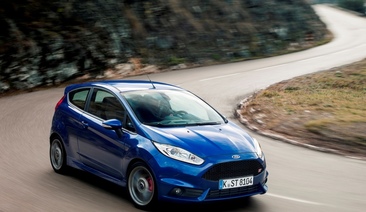News

Ford Delivers Fastest and Most Dynamic Fiesta ST Ever; 20% More Power and Fuel Economy than Previous Version
COLOGNE, Germany, March 11, 2013 – The new Ford Fiesta ST is Ford’s fastest and most dynamic small production performance car ever, employing a precision-tuned and driver-focused powertrain and chassis to deliver the ultimate Fiesta driving experience.
Developed by Ford Team RS, the European arm of Ford Motor Company’s Global Performance Vehicle group, the new Fiesta ST is equipped with a 1.6-litre EcoBoost petrol engine to achieve 0-100 km/h in 6.9 seconds and offer 182 PS and 240 Nm of torque. Top speed is 220 km/h.
Ford Team RS tuned the powertrain, suspension, steering and brakes for optimised driving dynamics; and introduced features only previously found in larger performance cars – including enhanced Torque Vectoring Control (eTVC) and 3-mode Electronic Stability Control (ESC), six-speed manual transmission and rear disc brakes.
Everyday practicality is underlined by fuel efficiency of 5.9 l/100 km and 138 g/km CO2* – a 20 per cent emissions reduction compared with the previous generation Fiesta ST, though it produces almost 20 per cent more power than the first-generation model’s 2.0-litre engine.
The new Fiesta ST features a large trapezoidal grille with a unique honeycomb construction and dramatic rear diffuser element. The refined high-contrast interior is equipped with Recaro seats, and a new Sound Symposer channels the engine note to the cabin to ensure the distinctive engine roar is integral to the driving experience. Ford has also introduced SYNC and MyKey.
“The new Fiesta ST delivers remarkable levels of performance, design and quality to offer an unsurpassed driving experience,” said Juergen Gagstatter, chief programme engineer, Fiesta ST. “Ford’s European customers are connoisseurs of the hot hatchback and the new Fiesta ST speaks directly to that passion for performance driving.”
Electronically-optimised enhanced chassis
eTVC applies brake force to the inside front wheel of the Fiesta ST when cornering to improve road holding and reduce understeer without affecting speed. New software controls the Fiesta ST’s balance in response to steering inputs under acceleration and braking – and ESC offers full system intervention; wide-slip mode with limited intervention; and full ESC de-activation.
Both systems support a specially modified front steering knuckle, adapted rear twist-beam with increased roll-stiffness, unique front and rear spring and damper settings, and a 15 mm lower centre of gravity; for optimised handling and ride quality.
Electronic Power Assisted Steering offers a sharper steering ratio of 13.69:1 and a shorter steering arm for a more direct response. The Fiesta ST debuts rear disc brakes on the Fiesta platform and introduces a larger tandem brake master cylinder that boosts braking performance.
“This car can put a smile on your face corner-after-corner and delivers absolute precision in power delivery and handling,” said Tyrone Johnson, Ford Team RS engineering manager.
EcoBoost engine technology
The EcoBoost engine’s low weight contributes towards improved handling; and brings technologies including turbocharging, high-pressure direct fuel-injection and Twin-independent Variable Cam Timing.
The unique engine and a new six-speed manual transmission calibration was refined at the Nürburgring Nordschleife over the equivalent of more than 100 laps of the 21 km circuit.
ST character inside and out
The Fiesta ST’s headlight design incorporates LED day-time running lamp technology and a full ST body kit; new paint options include Race Red, Molten Orange and Spirit Blue. The cabin also features carbon fibre dashboard inserts, alloy-metal pedals and gearshifter, and an ST steering wheel.
MyKey allows owners to set maximum speed and audio volume limits, and ensure safety features are not disabled, when allowing use of their car. Voice-activated in-car connectivity system Ford SYNC with Emergency Assistance directly connects vehicle occupants to local emergency services operators after an accident.
Developed for the track, but practical and economical
Ford subjected the new Fiesta to 850,000 kilometres of durability testing. To ensure the new Fiesta ST offers high levels of reliability even in the face of the most demanding customer usage Ford subjected the hot hatchback to a further 7,500 km of race track testing and 5,000 km of high speed testing.
This included a “torture test” at the Nardo Technical Centre proving grounds, Italy, during which the Fiesta ST was driven flat-out in temperatures in excess of 40 C.
“Many hot hatch fans will want to give the Fiesta ST the chance to shine on the track and we have made sure the Fiesta ST’s engine, transmission, chassis and body can handle the extreme use that its performance invites,” said Johnson.
# # #
* The stated fuel consumption and CO2 emissions are measured according to the technical requirements and specifications of the European Regulation (EC) 715/2007 as last amended. The results may differ from fuel economy figures in other regions of the world due to the different drive cycles and regulations used in those markets.
